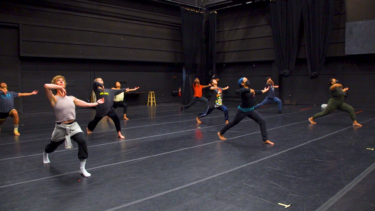October 6, 2022
The Chamber Dance Company is reconsidering what makes a dance important.
Comprised of University of Washington graduate students, the Chamber Dance Company works to perform, record and archive dance works of artistic and historical significance, particularly those that have rarely or never been seen by Northwest audiences. Since its founding in 1990, the company has primarily performed classical modern dance choreography dating as far back as 1895.
But for this year’s annual performance, the company will exclusively perform contemporary works created within the last 15 years. The choreography incorporates elements from ballet, street styles, classical and contemporary modern dance as well as projected and vocalized commentary –– a new direction with fresh challenges.
“Our repertoire is shifting,” said Rachael Lincoln, associate professor of dance and co-director of the Chamber Dance Company. “Part of that change is questioning and reassessing what makes historic work ‘significant’ and asking who can perform in that work.”
This year’s performance will celebrate a broad sweep of contemporary dance styles. Members of Seattle’s professional dance community will join the company to perform excerpts from Canadian Crystal Pite’s “Ten Duets on a Theme of Rescue” and Californian David Roussève’s “Stardust.” Additionally, faculty and undergraduate guests from the UW Department of Dance will join company members to stage new works choreographed by second-year UW graduate students Gary Champi and Jenn Pray.
“This is definitely a different repertoire than we’ve performed in the past,” said Hannah Wiley, professor of dance and founding artistic director of the Chamber Dance Company. “I’ve learned a lot along this journey. I’ve learned that this new direction can be liberating; it can free us to be more expansive and inclusive about our repertory and the dancers who perform it.”
The experiences of the current graduate students range from ballet to traditional Chinese dance to commercial dance, or dance created with entertainment or promotional purposes, to modern with an Afro-contemporary influence, meaning it’s based in rhythms from Africa and the diaspora.
Champi, who has an undergraduate degree in cognitive science from Stanford University, will have seven dancers portray the complex patterns and repetition resulting from the number seven as the denominator in “Vulgar Fraction.” “Silent Summer,” by Pray, is a dance theater solo that uses language and movement to portray a future Earth void of birdsong.
“It feels like the impetus for this new direction is largely thinking about who we are welcoming into our MFA program,” Lincoln said. “As dance in academia evolves to embrace artists with backgrounds in more styles, we must expand the Chamber Dance Company’s repertoire. It’s exciting to see.”

The Chamber Dance Company will perform Thursday, Oct. 13, through Sunday, Oct. 16, in the Meany Hall Studio Theatre.Kiyomi Taguchi
The company will also perform three duets from “Ten Duets on a Theme of Rescue” by Pite. The choreographer wrote that her dances were inspired “by the shared narratives that live in our bodies – the familiar, repetitive storylines that move across cultures and generations.”
“The dancers are taking some risks that they haven’t been asked to take in other works before,” Wiley said. “The audience needs to perceive the labor and the struggle in the work. Dancers have spent years trying to make the hardest thing look easy. To let go of that, which is to let go of a certain notion of what’s beautiful, has been a performative challenge.”
The program will conclude with a new excerpt from “Stardust,” which redefines the coming-of-age story through the digital age as it follows a Black, gay teenager who is never seen on stage. He is present only through the tweets and text messages he sends.
“The dancers on stage aren’t the character, but they are creating an emotional landscape for him to live in,” Lincoln said. “As a viewer of this piece, I think we go back and forth between seeing language that is evocative in one way and abstract movement that is evocative in a completely different way. There is something poignant and arresting in the way the two intersect – even if it’s hard to make sense of or challenging to digest.”
“Stardust” depicts bullying, and it contains projected text that includes racial and homophobic slurs and references to physical violence and explicit sexuality.
“I appreciated hearing David’s response to the reactions of past audiences, which ranged from moved and in love to offended,” Lincoln said. “He’s just like, ‘That’s all OK. We made this thing and then people receive it. However they receive it, that’s OK with me.’
“I love seeing this cast on stage. Knowing who would be in the company this year inspired us to ask David for the piece. It’s what David does. He intentionally puts such a range – of dance styles, race, age and experience – into his company, which allows for multiple perspectives to coexist on stage. I think that can be a profoundly beautiful part of contemporary dance.”
Katie Daugherty, operations manager for the Department of Dance and assistant to the director for the Chamber Dance Company, graduated with a bachelor’s degree in dance in 2020. She started noticing a change in the department’s focus while she was still at the UW. Now, she’s seeing the results.
“It feels exciting and important where the company is going,” Daugherty said. “It feels like it’s shifting. We’re asking, ‘What is the work we want to be restaging?’ I feel like this concert embodies such an important direction that even Seattle dance is going in. We’re also helping guide the audience that has been supporting the company for so many years into a new era.”
For more information, contact Wiley at hcw@uw.edu and Lincoln at rlincoln@uw.edu.
Tag(s): Chamber Dance Company • College of Arts & Sciences • Department of Dance • Hannah Wiley • Katie Daugherty • Rachael Lincoln







